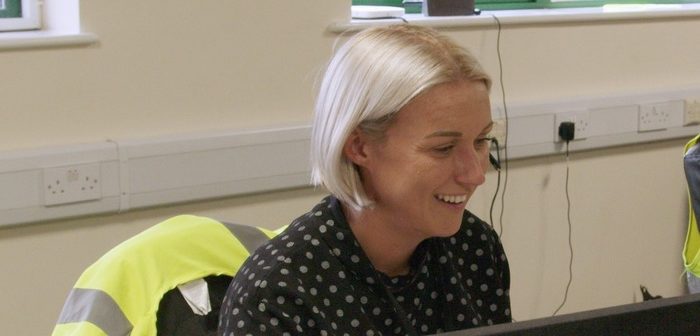While it can be easy to wish for overnight success, there is something to be said for careers that are built from the ground up. Vikki Britton is a prime example of rising through the ranks, from topping carrots on a production line as a teenager to becoming factory operations manager at the UK’s largest potato supplier, Branston. Describing her progression and the support along the way, Vikki discusses the importance of being open to any opportunities to gain experience – personally and professionally.
“As a teenager, I couldn’t have imagined the journey my career would take. It’s been far from straightforward but every step has helped to build my experience and made me into the manager I am today. I had once dreamed of working in childcare, and while I am mum to two of my own, I have certainly never regretted moving out of that sector and into a career in fresh produce with Branston. In fact, it has been the firm’s encouragement and flexibility that has enabled me to have a fulfilling career with progression while still being able to make time for my family.”
Vikki now oversees operations at Branston’s ever-expanding Prepared foods factory – living proof that factory production line jobs can provide a great foundation for building a career.
Changing course
Often early decisions to follow a set path can prevent people changing course, due to a lack of relevant qualifications or confidence. Vikki had planned for a career in childcare but was not deterred when other opportunities came her way.
“While I was studying childcare at King’s Lynn College, I worked at weekends for a fresh produce company on the carrot line, topping and sizing them into different baskets. I also did some quality assurance (QA) work at the weekend.
“After college, I went into the world of full-time childcare. It’s a great job and so rewarding but I soon realised it wasn’t for me. Needing to find an alternative I drew on my previous QA experience and I went for a role at a fresh produce packing factory where Branston was running two lines.
“It may have been a practical decision in the first instance, as the pay was better, but sometimes you have to think with your head – and for me it certainly paid off.”
After a period as a senior QA and an admin role, a supervisor job came up at Branston’s newly built prepared foods factory. Vikki joined as an area leader, looking after all aspects at the end of the line such as despatch and packing. She then went on to become a stand-in shift manager and after a year, the shift manager.
Support systems
Part of what helped Vikki progress was the support offered by Branston. Women are still under-represented throughout the fresh produce industry so Branston is doing what it can to encourage more women into the industry and to strive for gender equality in opportunities.
“The thing about me was that I didn’t have the self-belief to think I was good enough for a senior role but the company really supported me to progress,”.
“Factories are very male-orientated, so I think as a woman you feel like you’ve got more to prove. But it’s really about having the confidence to know that you can do the role.”
A major factor in supporting women is how maternity, paternity and parenthood is managed. Traditionally, women may have not received the encouragement to return to work, but with a more balanced approach to parenting for men and women, employees like Vikki can be given the chance to continue their career.
When Vikki returned to the business after maternity leave she initially found it difficult to juggle her two worlds. But discussing this with Branston enabled her to find an option that worked for her and her family, and Branston didn’t lose an essential member of the team.
“I was coming to work when my son was still asleep, I was getting home and he was asleep, and it just felt as though I’d had a child only to give him to a childminder. My lifestyle needed to change,” she said.
A job came up in the main office for a human resources (HR) officer, and despite not having the qualifications for the role, Vikki’s knowledge and relationships with people on the shop floor was invaluable and the company was able to put her through studies. Vikki started as an HR officer for prep while studying for the Chartered Institute of Personnel and Development qualification at Lincoln College and achieved level five.
From here she also moved over to the fresh factory HR team, before having her second child and returning once again.
Stepping up
While working in her HR role, Vikki was offered her next big step in the business – becoming operations manager. A job that would mean covering the whole fresh factory and its 450 employees – but one she was initially reluctant to take.
“I was very settled in in my HR role and I felt this would really turn my life upside down because I know that the world of production is 24/7 and it can take over your life,” she said.
“I did a six-month trial on the condition that if it did have an impact on my family life, then I would need to go back to my previous role. But two years later, I was still going strong.”
“It was a challenge at first and I had some coaching from an external source so that I could try to let go a bit and guide the team instead. I learnt to ask, ‘what do you think you should do?’ I really paid dividends in giving the team confidence to make their own decisions.”
In May 2022 Vikki transferred back over to the Prepared factory, as operations manager, to assist the management team there with some very ambitious plans for growth.
She said: “It’s all about building trust and developing the team so that they work really effectively together and giving them the confidence to make decisions so they don’t have to call you when you’re not around.”
A family affair
Vikki has been able to work around home and work responsibilities consistently while at Branston, and that both her children are in school, her hours have been adapted to fit around childcare. She has the understanding of her manager that should the school require her for anything, or if she needs to work from home, this can be possible.
“I think my experience has become something of an example to other working parents at Branston that it can be done,” she said.
“The company has changed a great deal over the years, there is a lot more flexibility and understanding. It’s all about building trusting relationships with the team.
“It is worth giving more trust to staff, because you get so much back in return. I learnt that from the way I was treated, and now I pass that on to my staff.”
Lessons learned
Having done the long shifts herself, Vikki is able to relate with the staff on the factory floor. Spotting potential is a crucial part of the process too and encouraging employees to move up if they want.
Vikki said: “Running a machine is very different to looking after a team, but we are prioritising the training and development side of the business to futureproof the company and give people that push.
“My experience has really proved how much can come out of a job. Within the food industry, it’s not all about packing and mundane tasks – but it’s good to start there because you get an understanding of the whole process, which can then be applied to decision-making further along the line.
“When you put time into a job, coming to work doesn’t feel like a chore. And at Branston, we’ve got such great people here, we’re like a family, and everyone is welcome. I never thought that my career would go in as many different directions as it has, but I’m so thankful for it. The skills achieved here could give me or anyone else the potential to work in other industries, having a wealth of transferable skills and knowledge in your back pocket.”




